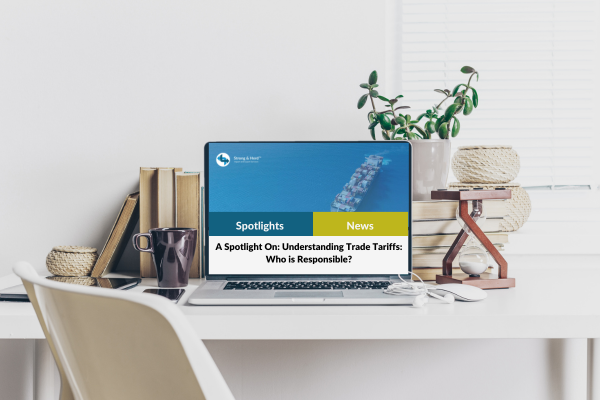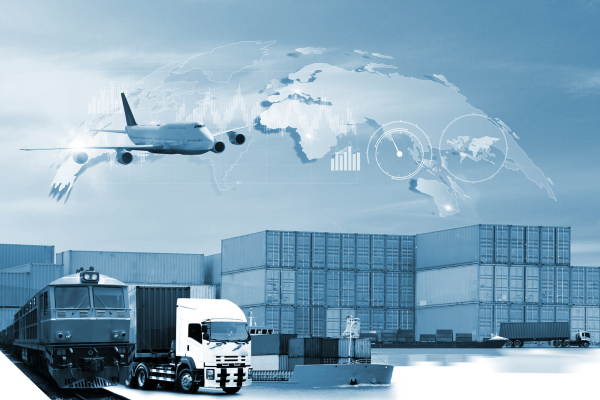BY:
SHARE:

Import tariffs have dominated the news recently, but who is responsible for covering these costs? The USA's actions to impose additional tariffs on certain goods from specific countries (and, in the case of some items, on all countries) have been met with retaliation from other countries. The result is that exporters and importers are potentially facing additional hurdles in doing business.
Import tariffs, also known as duties, are a form of taxation imposed on goods entering a country. Most countries use the Harmonised System of Classification for Goods, devised by the World Customs Organization. The duty rate is usually based on a percentage of the value of the imported goods. However, some countries may sometimes calculate duty on weight, volume, or a combination of factors. Governments impose import tariffs for two main reasons: to generate tax revenue and to protect local suppliers.
The most straight forward answer to ‘who pays?’ is that it depends on who is clearing the goods through Customs at import. This is typically agreed upon under the Incoterm® agreement, a set of rules published by the International Chamber of Commerce (ICC) that define the responsibilities of sellers and buyers for the delivery of goods under sales contracts. In all Incoterms® rules except one, the import clearance and payment of local duties and taxes falls to the recipient. The exception is the Incoterm® DDP (Delivered Duties Paid), where the sender is responsible for clearing the goods through Customs in the recipient’s country and pays all related duties and taxes. So, for most businesses, the importer pays the tariffs in most situations.
However, the consequences of imposing new tariffs may not always be so straightforward. Suppose an importer regularly sources products from a foreign supplier and now faces the prospect of a significant price increase on the landed goods purely because of a change to the tariff. In that case, there’s likely to be some negotiation between the buyer and seller, and to retain the business, the seller may be obliged to lower their price. Hence, the new tariff is effectively being ‘paid for’ by the exporter by lowering its price. Alternatively, the importer may switch to a local supplier whose price may now be relatively more attractive because of the new tariff. In most cases, it can be expected that at least some of the cost will be passed on to the end user.
The only change directly affecting UK exporters and importers is the 25% tariff on steel and aluminium imported into the United States, but the situation has been changing rapidly. However, if a UK exporter supplies goods of EU, Canadian, or Chinese origin, they may be subject to the recently increased tariffs.
It’s also essential to understand how rules of origin affect tariffs, and how goods that are transited through the UK or held in a Customs Warehouse before being re-exported are treated in the country of import. This understanding can make businesses feel more informed and knowledgeable about the potential impact on their exports and how they may be able to manage the impact.
The impact of tariffs on supply chains, pricing, and compliance is significant, making it crucial for companies to stay informed.
Understanding Free Trade Agreements
📅 Wednesday 16th April 2025 @ 10am
- Understand the definitions of Free Trade Agreements (FTAs) and Preferential Trade Arrangements (PTAs).
- Explore the factors contributing to the increasing prevalence of FTAs.
- Gain insights into WTO Rules of Origin and the typical coverage of goods in FTAs.
- Familiarise yourself with the EU-UK Trade Cooperation Agreement and its implications for your business.
- Investigate specific 'list rules' to determine whether your goods qualify for preferential treatment under PTAs and FTAs.
- Stay informed about the development of UK FTAs and membership to multinational agreements
- Recognise your responsibilities regarding compliance and procedural requirements.
- Learn about the Generalised System of Preferences DCTS – Developed Countries Trading Scheme as introduced into the UK and its relevance to your operations.
- Understand the processes involved in Origin Dispute Settlements and Customs Verification.
Focus On: Incoterms® 2020 Rules
📅 Thursday 15th May 2025 @ 10am
- Focus on Incoterms® Rules 2020, including a short review of its history and development since its inception in 1936.
- Understand what they do for trade, including practice and theory.
- Focus on the Incoterms® 2020 Rules, clearly explained and compared to previous sets.
- Review putting Incoterms® 202 Rules into practice.
- Focus on the different viewpoints from a sales, procurement and logistics perspective.
Understanding Origin & Preference
📅 Monday 19th May 2025 @ 10am
- Understand the rules surrounding origin, including distinguishing between preferential and non-preferential.
- Gain awareness of non-preference origin rules.
- Explore the background of preferential trade.
- Enhance your understanding of origin rules, including substantial versus insufficient transformation.
- Familiarise yourself with the necessary preference documentation relevant to your business.
- Recognise your roles and responsibilities, including record-keeping and collaboration with HMRC.
- Learn more about the UK Developed Countries Trading Scheme (DCTS) that replaced the EU Generalised System of Preferences (GSP)and current UK aims in establishing trade agreements.
📅 Thursday 22nd May 2025 @ 10am
- Understand what a Customs Warehouse is and how it can benefit your business.
- Focus on Customs Guarantees, what they are, and when they are required
- Review Customs Special Procedures, understanding how they can save businesses money and work with a Customs Warehouse Authorisation
- Gain a deeper understanding of the responsibilities of operating a customs warehouse, including record-keeping
- Overview of the application process and understanding of the contract with HMRC
- Understand the benefits, administration costs, software requirements and where to find further information
OneCall™ Email assistance as and when required; A one-call solution for all your import, export and customs enquiries. Export help. Import help. Customs help.
Stay informed about customs and international trade matters by subscribing to our OneCall™ service. This comprehensive offering includes a dedicated email helpline for support, timely practical updates direct to your inbox (Did You Know?), monthly UK Customs & Trade Briefings and access to an interactive members' area with an exclusive community for our subscribers.
International Trade Updates & Spotlight Newsletter
Subscribe to our free information emails covering international trade topics...
MORE INDUSTRY INSIGHTS...









